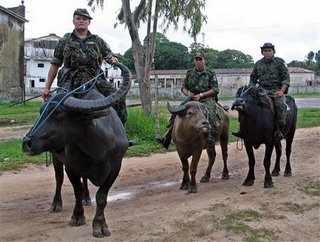 Brazil's army has started drafting a low-tech but effective transporter for its Amazon operations to complement its modern military arsenal -- water buffalo.
Brazil's army has started drafting a low-tech but effective transporter for its Amazon operations to complement its modern military arsenal -- water buffalo.
The sturdy horned animals can easily carry supplies and munitions in remote areas where there are no roads, fuel is scarce, or rivers are too shallow to navigate, officers say.
"The buffalo have had excellent operational results and increased the distances we can cover," General Eduardo Dias da Costa Villas Boas, the chief of the Brazilian Army in the Amazon, said on Friday.
They weigh about 500 kg (1,100 pounds) and can carry the same amount, he added.
Brazil has some 27 military bases securing its rugged Amazon border, a dangerous frontier abutting seven nations that stretches 11,200 km (6,800 miles) -- three times the length of the U.S. border with Mexico.
The army has to contend with diamond smugglers, cocaine traffickers, clashes between loggers and Indians, and Colombian guerrillas who sometimes hide out in Brazilian territory.
Supplies arrive at the bases by plane or boat, but to reach outlying training and patrol operations, they must be moved along narrow trails through thick jungle.
Other pack animals, such as mules, were considered but they would have needed special food and been more prone to disease.
Each base along the border was sent three water buffalo last year. The program will be expanded once tests of newly designed cargo packs are completed.
The Army gets the docile and disease-resistant animals from Marajo Island, a land mass the size of Switzerland at the mouth of the Amazon River. Portuguese settlers brought them to Brazil from Asia centuries ago.
"They don't require gasoline or special food. Buffalo eat anything," Villas Boas said.
2 comments:
maybe in texas we can train our longhorns to let us ride them...saddle up your bull and head to town..we do still have places that have hitching posts for their horses..really...
Just think,Texas national guard will have the nicest rose gardens with all that cowshit created by their new transport.
Post a Comment